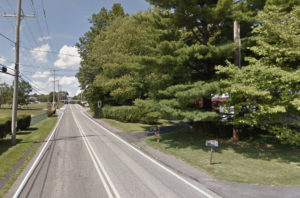One day when I was about eight years old and a friend’s mom was driving the carpool, she drove off without me. Her name was Mrs. Collevecchio.
I was at the swim club a few miles from home, and I remember seeing her station wagon pull into the lot. Within a few seconds, her car was beside our little crowd, and our group had piled in, and she was heading back out, and for some reason—had I forgotten my towel and run back for it?—I don’t remember, but I didn’t climb into the car, and Mrs. Collevecchio didn’t notice my absence.
To this day, I can see the back of that station wagon rolling away, see the dust in its wake, the matted grass and weedy gravel of the lot. With the memory comes a tight feeling in my gut. I wanted to yell, Wait!, but the thought of yelling brought shame, so I didn’t. There were other parents picking up and dropping off kids, and there was a teenager at the gate checking people in, and I couldn’t stand the thought of them or anyone staring at me.
I might have waved. Maybe I jumped up and down, maybe once. Then I froze. Mrs. Collevecchio had left me behind.
I felt my eyes tear up, and I sniffed and clutched my towel and tried to keep my composure. I blamed myself. Clearly, it was my fault that I’d missed the carpool.
I had no money for the pay phone, and no cell phone (this was long before cell phones). I could have gone to the office and asked to use the phone to call my mom, but I feared I’d cry, and anyway, telling would make me a tattle-tale, and I knew not to go there. It would be wrong to get Mrs. Collevecchio in trouble.
So I started walking.
 There was a crummy asphalt sidewalk, and I was in flip flops, and I remember watching for uneven spots. I hadn’t ever walked alone outside my neighborhood, but I’d watched Mom drive to the pool often enough, and I was pretty sure I knew the route. I looked both ways before crossing streets and chewed my lip to keep from crying. I wrapped my towel around my middle, tying it into a knot so it would stay, which it did for a while. Then it slipped and I had to tie it again. I didn’t look at the faces in cars going by because I didn’t want anyone to see how scared I felt, or how ashamed. I told myself I could do it. And I walked. And walked.
There was a crummy asphalt sidewalk, and I was in flip flops, and I remember watching for uneven spots. I hadn’t ever walked alone outside my neighborhood, but I’d watched Mom drive to the pool often enough, and I was pretty sure I knew the route. I looked both ways before crossing streets and chewed my lip to keep from crying. I wrapped my towel around my middle, tying it into a knot so it would stay, which it did for a while. Then it slipped and I had to tie it again. I didn’t look at the faces in cars going by because I didn’t want anyone to see how scared I felt, or how ashamed. I told myself I could do it. And I walked. And walked.
A couple of months ago, I re-lived that walk in order to write a scene. I held back tears while my character held back his. I felt determined and scared as hell, and so did my character. He didn’t let himself look into the faces in cars going by. His guilt from everything he’d ever done wrong in his life came to mind, and he walked faster. The circumstances that had gotten him to that street were nothing like mine, but his emotional truth was the same. Writing fiction is all about tapping into emotional truths.
Mom tells me that when Mrs. Collevecchio got back and I wasn’t in the car, Mom zoomed off, leaving my brother and sister with her, racing to the pool, sure I’d be there, waiting. She spotted me walking along the road. By the time she picked me up, I’d made it about half way home. I don’t recall whether I cried with relief when I slid into the seat beside her, but I remember feeling relieved. For years afterward, Mom talked about what a determined kid I was. Maybe she said stubborn, too. I don’t think I ever told her how scared I felt that day. My character isn’t going to tell anyone that part, either.

What a wonderful memory to use in the book. I bet your Mom was proud of you and if she saw you crying probably didn’t think it was as important as your bravery. She discounted your sadness, which the reader can see. You were stoic and brave to walk. You were more than merely stubborn, you were determined.
Thanks.
Yes, I was determined that day!
I wish I could remember even more moments from childhood. They’re so rich. Sometimes when I’m journaling, memories return and I take stock of how my body feels inside the memory, how I’m breathing (or not), how my skin feels, my posture, the angle of my head, the length of my stride. Taking stock is kind-of like researching a setting. The details provide depth.
I appreciate this story, though I know you were terrified at the time. I look forward to reading the scene that you create from it. For many years, I avoided facing my childhood memories, and ROGUE was a difficult book for me to write because it contained so much of my past and the bullying I experienced (which I never managed to handle very effectively).
It’s really hard to handle bullying effectively. Maybe that’s why all of us love to read superhero stories and go to superhero movies and imagine ourselves with superpowers, like your character imagines in ROGUE. Childhood is a really tough time. In HEADING OUT TO WONDERFUL, author Robert Goolrick writes, “Childhood is the most dangerous place of all and no one gets past it unscarred… If we had to live there forever, we wouldn’t live very long.” Kudos to you for re-living some of your childhood and writing about it.